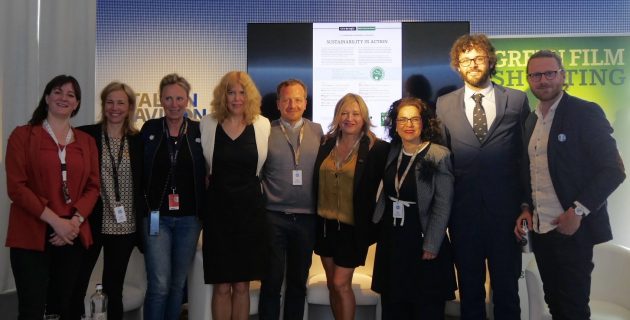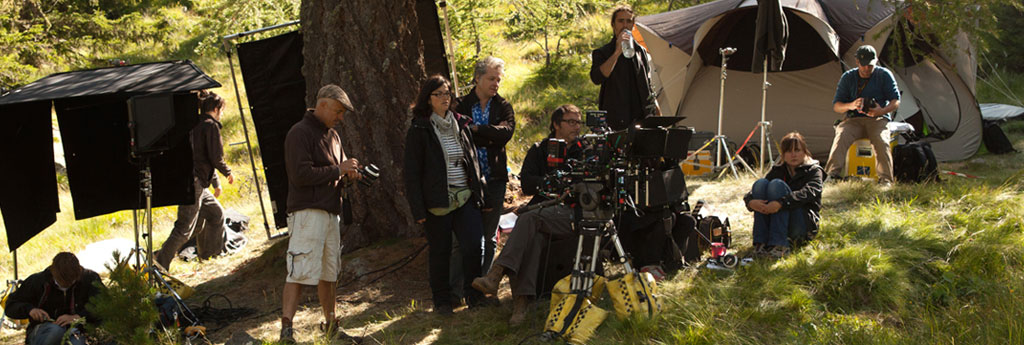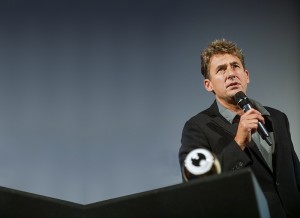
Hosted by Green Film Shooting and CineRegio at the 72nd Cannes Film Festival, the panel discussion Sustainability in Action brought together producers, film fund representatives, eco-consultants and technical experts who talked about approaches and strategies to green film production. As the pan-European association for regional film funds in Europe, CineRegio is representing close to 200 million euro per year to support film. "At this year Cannes film festival, the regional film funds in our network have provided financial support to 52% of the films in this year Main Competition", says Charlotte Applegren, General-Secretary, CineRegio. "This means that we also must act with responsibility for the society we are part of. Our goal is that by the end of this year, 50% of the regional film funds in our association will have a strategy for greening film production in their territory."
A wake-up call for the film industry is also coming from Sweden where producer Ronny Fritsche launched a climate change campaign that is backed by about 500 talents and industry members in Sweden and Norway. The Zentropa producer did not come to Cannes but hold a keynote via video at the Sustainability in Action panel.
"There is no more discussion that pre-production, production and post production must go green", emphasized Nevina Satta, CEO, Sardegna Film Commission. "We will force every production company to apply the green protocol. And it is not anymore negotiable." According to Helge Albers, CEO, Filmförderung Hamburg Schleswig-Holstein, the perception that there is a hurdle for productions to be green is the actual core of the problem. "We are talking about a cultural shift that we have to deal with and to fascilitate. Like every cultural shift we are facing some backlash and resistance. We have seen it across several fields in society with recycling of plastic bottles. Every time you introduce new ideas, peoples are afraid that this costs us jobs, development and growth", underlined Helge Albers. "I believe in incentivizing these shifts rather than in cutting budget."
For Joanna Gallardo, Head of Institutional Relations Film Paris Region/ Ecoprod, France, that is the right way to push the film industry to go green . "In ten years of experience, we realized if we don’t have some institutional support from the film commissions, we won’t manage to push the whole sector to turn green", explained Gallardo. Therefore, the Film Paris Region provides productions with an eco-bonus up to 25,000 euros if the films are produced eco-friendly.
In Trentino, the film commission developed the T-Green Film Rating System that features incentives for producers who decide to go green. "Our local agency for environmental protection is in charge for the certification for the film production", said Luca Ferrario, Project Manager, Trentino Film and Film Commission Fund. "About 50 percent of the film productions in Trentino are applying for the green certification."
The Italian producer Simone Gattoni presented two films in the official program of this years Cannes film festival. "Abel Ferrara’s film Tommaso was shot green. It was a very small project that was shot in two streets in Rome with a small crew and without any big trucks. Also the catetering was vegetarian", reported the producer. Meanwhile the Golden Palm contender The Traitor by Marco Bellochio had a big impact on the environment. "The movie was shot 15 weeks all around the world so that cast and crew were taking planes to Germany and Brazil", Simone Gattoni outlined. " I became very much aware about how much devastating we can be. I changed how the company will face production from now onwards even without funding."
In Paris, the consulting company Secoya tries to help clients to shoot green and to reduce their carbon footprint. "There are many ways to reduce the costs of going green", said Charles Gachet-Dieuzeide, Founder and CEO, Secoya. "In Paris, you don’t pay for the parking if you use an electric car which about eight euros for an hour." In the British metropol London Melanie Dicks is consulting productions with her company Greenshoot since several years. She also suggested financial incentives for film productions: "Let’s have a two percent green tax credit", underlined Melanie Dicks . "You will every producer lining up across the Croisette here in an hour if the regional funds decide to do that today."
A big part of the carbon emissions of film productions is generated due to power consumption. In several big cities there are already stricter regulations that are prohibiting diesel generators on film sets at certain hours in order to prevent noise and emissions. A more sustainable solutions is developed by the EU-funded project Everywh2ere in which twelve partners from all across Europe are participating. "Our goal is to produce electricity for temporary events such as film sets via hydrogen", Stefano Barberis, Project Manager, Everywh2ere, assures. "It is as dangerous as your traditional car. Of course, there are some safety aspects that have to be considered because hydrogen has to be transportered under big pressure."
The plan is to produce eight generators with 20 KW and 100 KW until summer 2020 that will be demonstrated at temporary events such as fares, exhibitons, music festivals, film sets, and construction sites. "The idea is to change the paradigma from daily use of power generation. A fuel cell is converting hydrogen to power", concludes Stefano Barberis. "It is easy to use and it is no rocket science , even if hydrogen technology comes from rocket science."
Photo:© GFS/ Video © Ronny Fritsche/Zentropa













 Robert Redford
Robert Redford Hannes Jaenicke
Hannes Jaenicke Nic Balthazar
Nic Balthazar Nadeshda Brennicke, Actress
Nadeshda Brennicke, Actress Darren Aronofsky, Director, Noah / Jury President, 65th Berlin International Film Festival
Darren Aronofsky, Director, Noah / Jury President, 65th Berlin International Film Festival Tim Bevan
Tim Bevan Thekla Reuten
Thekla Reuten Rachael Joy
Rachael Joy Nikola Rakocevi
Nikola Rakocevi Nadja Schildknecht
Nadja Schildknecht Michael Bully Herbig
Michael Bully Herbig Lars Jessen
Lars Jessen Helen Hunt
Helen Hunt Douglas Trumbull
Douglas Trumbull Dieter Kosslick, Director Berlin International Film Festival
Dieter Kosslick, Director Berlin International Film Festival Benoit Delhomme
Benoit Delhomme Jeremy Irons
Jeremy Irons